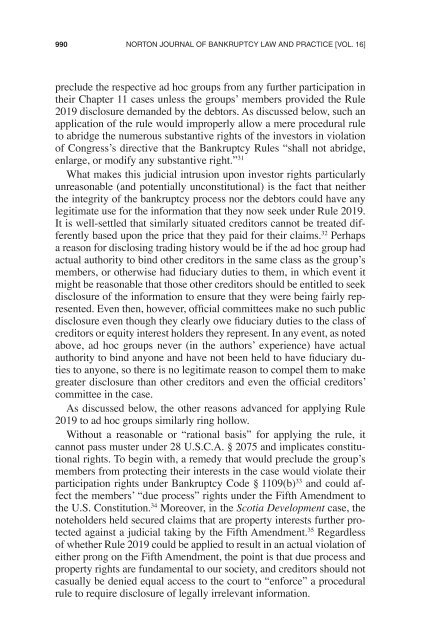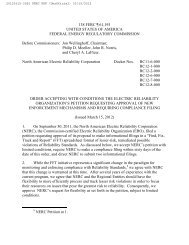Ad Hoc Committees and the Misuse of Bankruptcy Rule 2019
Ad Hoc Committees and the Misuse of Bankruptcy Rule 2019
Ad Hoc Committees and the Misuse of Bankruptcy Rule 2019
Create successful ePaper yourself
Turn your PDF publications into a flip-book with our unique Google optimized e-Paper software.
990 Norton Journal <strong>of</strong> <strong>Bankruptcy</strong> Law <strong>and</strong> Practice [Vol. 16]<br />
preclude <strong>the</strong> respective ad hoc groups from any fur<strong>the</strong>r participation in<br />
<strong>the</strong>ir Chapter 11 cases unless <strong>the</strong> groups’ members provided <strong>the</strong> <strong>Rule</strong><br />
<strong>2019</strong> disclosure dem<strong>and</strong>ed by <strong>the</strong> debtors. As discussed below, such an<br />
application <strong>of</strong> <strong>the</strong> rule would improperly allow a mere procedural rule<br />
to abridge <strong>the</strong> numerous substantive rights <strong>of</strong> <strong>the</strong> investors in violation<br />
<strong>of</strong> Congress’s directive that <strong>the</strong> <strong>Bankruptcy</strong> <strong>Rule</strong>s “shall not abridge,<br />
enlarge, or modify any substantive right.” 31<br />
What makes this judicial intrusion upon investor rights particularly<br />
unreasonable (<strong>and</strong> potentially unconstitutional) is <strong>the</strong> fact that nei<strong>the</strong>r<br />
<strong>the</strong> integrity <strong>of</strong> <strong>the</strong> bankruptcy process nor <strong>the</strong> debtors could have any<br />
legitimate use for <strong>the</strong> information that <strong>the</strong>y now seek under <strong>Rule</strong> <strong>2019</strong>.<br />
It is well-settled that similarly situated creditors cannot be treated differently<br />
based upon <strong>the</strong> price that <strong>the</strong>y paid for <strong>the</strong>ir claims. 32 Perhaps<br />
a reason for disclosing trading history would be if <strong>the</strong> ad hoc group had<br />
actual authority to bind o<strong>the</strong>r creditors in <strong>the</strong> same class as <strong>the</strong> group’s<br />
members, or o<strong>the</strong>rwise had fiduciary duties to <strong>the</strong>m, in which event it<br />
might be reasonable that those o<strong>the</strong>r creditors should be entitled to seek<br />
disclosure <strong>of</strong> <strong>the</strong> information to ensure that <strong>the</strong>y were being fairly represented.<br />
Even <strong>the</strong>n, however, <strong>of</strong>ficial committees make no such public<br />
disclosure even though <strong>the</strong>y clearly owe fiduciary duties to <strong>the</strong> class <strong>of</strong><br />
creditors or equity interest holders <strong>the</strong>y represent. In any event, as noted<br />
above, ad hoc groups never (in <strong>the</strong> authors’ experience) have actual<br />
authority to bind anyone <strong>and</strong> have not been held to have fiduciary duties<br />
to anyone, so <strong>the</strong>re is no legitimate reason to compel <strong>the</strong>m to make<br />
greater disclosure than o<strong>the</strong>r creditors <strong>and</strong> even <strong>the</strong> <strong>of</strong>ficial creditors’<br />
committee in <strong>the</strong> case.<br />
As discussed below, <strong>the</strong> o<strong>the</strong>r reasons advanced for applying <strong>Rule</strong><br />
<strong>2019</strong> to ad hoc groups similarly ring hollow.<br />
Without a reasonable or “rational basis” for applying <strong>the</strong> rule, it<br />
cannot pass muster under 28 U.S.C.A. § 2075 <strong>and</strong> implicates constitutional<br />
rights. To begin with, a remedy that would preclude <strong>the</strong> group’s<br />
members from protecting <strong>the</strong>ir interests in <strong>the</strong> case would violate <strong>the</strong>ir<br />
participation rights under <strong>Bankruptcy</strong> Code § 1109(b) 33 <strong>and</strong> could affect<br />
<strong>the</strong> members’ “due process” rights under <strong>the</strong> Fifth Amendment to<br />
<strong>the</strong> U.S. Constitution. 34 Moreover, in <strong>the</strong> Scotia Development case, <strong>the</strong><br />
noteholders held secured claims that are property interests fur<strong>the</strong>r protected<br />
against a judicial taking by <strong>the</strong> Fifth Amendment. 35 Regardless<br />
<strong>of</strong> whe<strong>the</strong>r <strong>Rule</strong> <strong>2019</strong> could be applied to result in an actual violation <strong>of</strong><br />
ei<strong>the</strong>r prong on <strong>the</strong> Fifth Amendment, <strong>the</strong> point is that due process <strong>and</strong><br />
property rights are fundamental to our society, <strong>and</strong> creditors should not<br />
casually be denied equal access to <strong>the</strong> court to “enforce” a procedural<br />
rule to require disclosure <strong>of</strong> legally irrelevant information.



